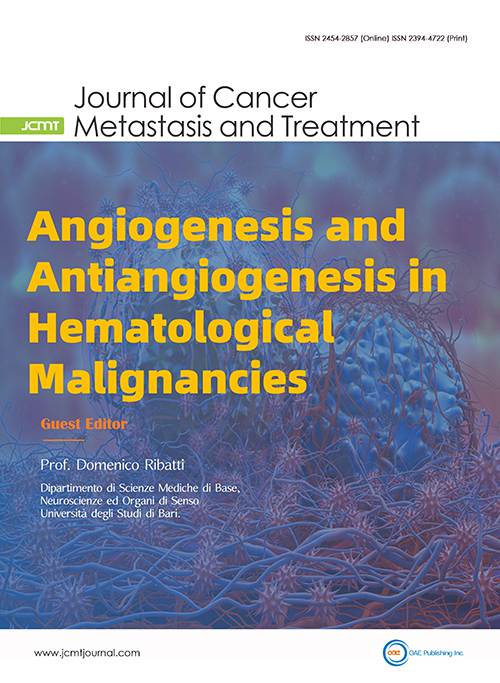
Topic: Angiogenesis and Antiangiogenesis in Hematological Malignancies
A Special Topic of Journal of Cancer Metastasis and Treatment
ISSN 2454-2857 (Online) 2394-4722 (Print)
Submission deadline: 31 Dec 2021
Guest Editor
Special Topic Introduction
It has been generally accepted that angiogenesis is involved in the pathogenesis of hematological malignancies, like acute and chronic leukemia, lymphoma, myelodysplastic syndromes, myeloproliferative neoplasms, and multiple myeloma. The extent of angiogenesis in the bone marrow is correlated with disease burden, prognosis, and treatment outcome. Reciprocal positive and negative interactions between tumor cells and bone marrow stromal cells, namely hematopoietic stem cells, fibroblasts, osteoblasts/osteoclasts, endothelial cells, endothelial progenitor cells, T cells, macrophages and mast cells, mediated by an array of cytokines, receptors and adhesion molecules, modulate the angiogenic response in hematological tumors. More recently, the pro-angiogenic role of the so-called "vascular niche" has been emphasized, indicating a site rich in blood vessels where endothelial cells and mural cells such as pericytes and smooth muscle cells create a microenvironment that affects the behavior of several stem and progenitor cells in hematological malignancies.
Anti-angiogenesis was proposed as a cancer therapy over 40 years ago, when Judah Folkman published in the New England Journal of Medicine a hypothesis that tumor growth is angiogenesis-dependent. Several preclinical and clinical trials are exploring the combination of various angiogenesis inhibitors in the treatment of hematological malignancies with other targeted therapies.
The following topics will be discussed in this Special Issue:
The bone marrow microenvironment
Circulating endothelial cells
Endothelial precursor cells
Myeloid derived suppressor cells
Soluble factors and transduction pathways
Exosomes and angiogenesis in MM
Proteasome inhibitors
Receptor tyrosine kinase inhibitors
Immunomodulators
Bisphosphonates
Monoclonal antibodies
Combination therapies
Anti-angiogenesis was proposed as a cancer therapy over 40 years ago, when Judah Folkman published in the New England Journal of Medicine a hypothesis that tumor growth is angiogenesis-dependent. Several preclinical and clinical trials are exploring the combination of various angiogenesis inhibitors in the treatment of hematological malignancies with other targeted therapies.
The following topics will be discussed in this Special Issue:
The bone marrow microenvironment
Circulating endothelial cells
Endothelial precursor cells
Myeloid derived suppressor cells
Soluble factors and transduction pathways
Exosomes and angiogenesis in MM
Proteasome inhibitors
Receptor tyrosine kinase inhibitors
Immunomodulators
Bisphosphonates
Monoclonal antibodies
Combination therapies
Submission Deadline
31 Dec 2021
Submission Information
For Author Instructions, please refer to https://www.oaepublish.com/jcmt/author_instructions
For Online Submission, please login at https://www.oaecenter.com/login?JournalId=jcmt&IssueId=jcmt211231503
Submission Deadline: 31 Dec 2021
Contacts: Carl Zhou, Assistant Editor, [email protected]









